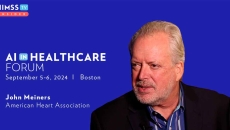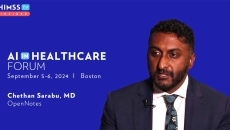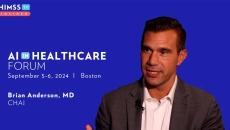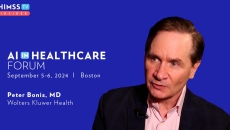Videos
John Meiners, chief of mission-aligned businesses and healthcare solutions for the AHA, says it has "transformative capability" to improve knowledge and insights for cardiology research and clinical guidelines.
Dr. Gerald Lip of the U.K.'s NHS Grampian says that using AI algorithms has allowed a shrinking pool of radiologists to work more efficiently and provide test results in three days, instead of two weeks.
Large language models are "enabling a new level of patient empowerment" by helping people understand clinical notes, navigate insurance claims and much more, says Dr. Chethan Sarabu, AI and informatics strategist at OpenNotes.
What does the next year in AI and genAI look like? How can and must AI help with the clinician shortage? Is fearmongering detrimental to AI's future? Greg Miller, vice president of business development at Carta Healthcare, has the answers.
At the VA, automation is helping innovate troubleshooting, maintenance other med device management tasks, says Christopher Ahn, biomedical engineer supervisor at the U.S. Department of Veterans Affairs in Dayton, Ohio.
The Coalition for Health AI is helping chart the way forward with its draft framework for responsible deployments and other critical guidance. CHAI's cofounder Dr. Brian Anderson talks model integrity, assurance labs, alignment and more.
Dr. Diana van Stijn, Lapsi Health CMO, talks about how the company turned an idea for a sound-based clinical tool into a new product by incorporating feedback about what features would be useful to clinicians.
That's models that work and are clinically useful, says Dr. Lukasz Kowalczyk, a physician at Colorado's Peak Gastroenterology Associates, who describes the need to strategically deploy AI across the enterprise.
Alexander Berler of IHE Catalyst discusses how digital health companies will need to collaborate with each other and meet four different levels of interoperability to satisfy the new European Health Data Space regulations.
Dr. Peter Bonis, chief medical officer at Wolters Kluwer Health, says building trust in AI tools, at the enterprise level and end user level, depends on effective EHR integration and models that work.









